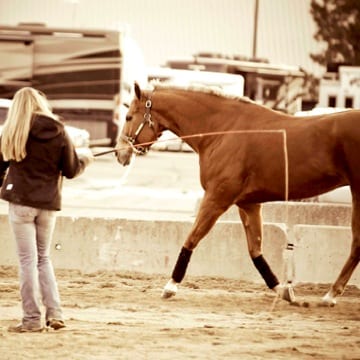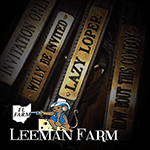The controversial topic currently being debated among exhibitors, trainers and horse owners across the country involves the possibility of only arena-legal equipment being allowed on horse show grounds.
The specific equipment in question is anything that qualifies in the AQHA Rulebook as illegal show equipment such as draw reins, illegal bits, etc. Some industry professionals are concerned as to where the line on legal equipment may be drawn and the snowball effect such measures may have on the industry. Others, in particular AQHA’s newly formed Animal Welfare Commission (AWC), voice concern over what impact not taking a proactive approach may have.
Are the industry professionals resisting change at the sake of the betterment of the horse business? Or, is AQHA knee-jerk reacting to unrealistic pressures from out of touch, outside organizations?
GoHorseShow.com spoke with multiple World Champion trainers, Gil Galyean, Leslie Lange and Charlie Cole who are all outspoken about these possible new changes. Tom Persechino, AQHA’s Executive Director of Competition and Breed Integrity spoke at length with GoHorseShow.com as well.
AQHA and the AWC have been trying to take a proactive approach against inhumane treatment toward our horses. AQHA recently passed a new rule that showmanship whips, war bridles or any type of wire or rope over a horse’s head will not be allowed at AQHA shows which went into effect on January 1, 2012.
At their February meeting in Dallas, Texas, the newly formed AWC discussed equipment that is described as legal in the AQHA rulebook as it relates to the show grounds. In addition, two rule changes were submitted to the Show and Professional Horseman Committee agenda and will be discussed and voted on during the AQHA Convention in Las Vegas
in March and then sent to the Executive Committee. Those agenda items
were submitted by members in Europe. These items, which are also regarding equipment, are separate from what the AWC may recommend.
The agenda items shown below
Agenda item #4 – Add new rule – A horse may not be ridden, driven, or led, nor exercised anywhere on the show grounds with prohibited equipment. The use of prohibited equipment shall disqualify the horse from that show and may result in disciplinary action taken against the rider, handler, agent or owner.
1.) For lungeing a horse a lunge-line and a long whip is allowed.
2.) Senior horses can be exercised with equipment allowed for junior horses
Agenda item #8–Add to Western Equipment rule 443–Ban the use of draw reins used with a curb bit while on the grounds at any AQHA event.
Many trainers and exhibitors are concerned that these rule changes are unfair because they would limit how they can prepare a horse at the shows. AQHA judge and Professional Horseman Charlie Cole says that the equipment is not the problem, but how it is used.
“It is a very small group of people that use equipment improperly, and it is unfair to punish everyone for a select few offenders,” Cole believes. “It is all about eliminating the bad behavior not the equipment. I fear this may snowball and lead to spurs, tie-downs and other equipment being banned.”
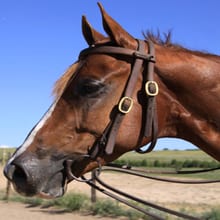 AQHA Executive Director of Competition and Breed Integrity Tom Persechino offers more insight into Cole’s viewpoint on the equipment issue.
AQHA Executive Director of Competition and Breed Integrity Tom Persechino offers more insight into Cole’s viewpoint on the equipment issue.
“I think the point needs to be made that nobody is being ‘punished,’ and we probably need to remove that from our collective thinking. Regardless of the number of people who are using equipment improperly or harshly, the use of all equipment needs to be addressed and horsemen and women need to understand that it only takes one person to create a negative perception of our industry,” Persechino told GoHorseShow. “If our mutual goal is to constantly safeguard the welfare of the horse, then discussions on equipment and training techniques, especially those that perhaps we have become numb to but recognize are unacceptable – must be addressed. We are living in a very different time where social media, technology and people’s unfamiliarity with the horse industry constantly puts us in a defensive mode.”
Persechino adds, “There is legislation in Washington, D.C., seeking to amend the Horse Protection Act. If anybody wants to talk about a punishing environment, imagine what it would be like to live, train, show and earn a living while trying to operate under strict government regulations. That is the last thing any of us should wish for…and it is a very real threat.”
AQHA Professional Horseman and Animal Welfare Commission member Sandy Vaughn also agrees with Persechino’s assessment of the issue. Vaughn believes that the inhumane treatment of our horses is a rampant problem in our industry.
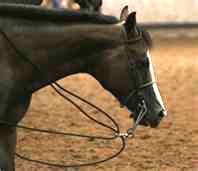 “AQHA has received multiple letters from all over the country about possible abuse at shows and the Animal Welfare Commission watched videos that showed training practices that were completely unacceptable,” Vaughn reveals. “We as an industry have been so desensitized about some of the training practices we witness at the shows. We need a huge wake up call. Everyone needs to realize how these types of training aids and practices look to the general public. No one in our industry has taken seriously all the warnings given about inhumane treatment to our horses as the general public perceives it–which in turn alerts PETA, Humane Society and some of the government agencies. AQHA wants us to be the governing body for the humane treatment of our horses. We want to prevent what happened in the Walking Horse industry.”
“AQHA has received multiple letters from all over the country about possible abuse at shows and the Animal Welfare Commission watched videos that showed training practices that were completely unacceptable,” Vaughn reveals. “We as an industry have been so desensitized about some of the training practices we witness at the shows. We need a huge wake up call. Everyone needs to realize how these types of training aids and practices look to the general public. No one in our industry has taken seriously all the warnings given about inhumane treatment to our horses as the general public perceives it–which in turn alerts PETA, Humane Society and some of the government agencies. AQHA wants us to be the governing body for the humane treatment of our horses. We want to prevent what happened in the Walking Horse industry.”
Persechino confirms that AQHA receives several letters, phone calls, and e-mails every year about potential claims of abuse at the shows. “AQHA is no longer going to defend bad behavior. That means training practices that cross the line, misuse of equipment regardless of how humane one wants to claim it might be and things like this have to become a thing of our past,” Persechino states. “The vast majority of trainers and exhibitors are good people who have the best interest of the horse in mind. Unfortunately, there are some in the minority who don’t want to be part of a move that puts further safeguards in place to protect our horses. I agree we need to address those people directly and have them become advocates of the Animal Welfare Commission’s goals.”
AQHA judge and trainer Sherrye Johnson-Trafton of New Brunswick, Maine was a show steward at an international competition recently where only arena-legal equipment was allowed.
“I have shown in other disciplines that have rules governing what you can ride with for training equipment. I haven’t found it to be a problem or hinder our showing enjoyment,” she says. “I recently AQHA Show Stewarded an international competition in Germany that had rules on training equipment. I found that exhibitors welcomed a more level playing field and the positive public perception was high.”
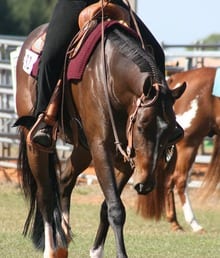 On the other hand, multiple World and Congress Champion western pleasure trainer Gil Galyean of Purcell, Oklahoma, has a differing opinion on the equipment issue. Galyean is also concerned about the possibility of certain training aids being banned on the show grounds.
On the other hand, multiple World and Congress Champion western pleasure trainer Gil Galyean of Purcell, Oklahoma, has a differing opinion on the equipment issue. Galyean is also concerned about the possibility of certain training aids being banned on the show grounds.
“I am against the proposed equipment changes that the AWC is considering and the ones being presented at the AQHA Convention. I believe the commission should have had a broader base of active trainers, and I firmly believe we are punishing the people that buy and show horses. They are the ones that allow me to make a living,” Gil explains. “These people are the ones we should listen to. I think conduct at horse shows has greatly improved over the last few years. It is my belief that if AQHA chooses to implement this rule, it will only push the professionals toward cutting and reining. Can we not use some common sense?”
NSBA President and AQHA Professional Horseman Leslie Lange of Greeley, Colorado says, “Instead of taking away the training equipment, we need to educate our professionals and members on the perception of abuse and the practices that contribute to that perception. We need to show the videos that illustrate inappropriate behavior and have a discussion about the problem in our industry,” she says. “We don’t need to have a knee jerk reaction and just immediately ban the use of equipment. I have seen some of the videos that Vaughn mentioned and many of the people that were being inhumane were not using training aids. They were riding in legal equipment–that illustrates that the equipment is not the problem, the training practices might be the issue at hand.”
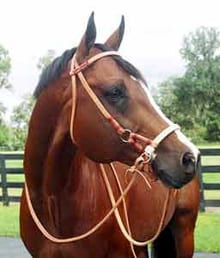 Lange adds, “Training aids such as German martingales are also very beneficial to entry-level novice exhibitors who use them to practice the trail and other events. It will unnecessarily make them insecure about their abilities if they are unable to practice with these training aids. Also, trainers that want to bring young horses to the shows probably won’t because they can’t use training aids that help them navigate around seasoned horses. Also, it will lead these young horses to not being adequately prepared for their future show careers. It will also hurt the shows because the trainers won’t bring their young horses to the show grounds and the shows will be losing the income from those stall fees which doesn’t make much sense in an already financially strapped industry.”
Lange adds, “Training aids such as German martingales are also very beneficial to entry-level novice exhibitors who use them to practice the trail and other events. It will unnecessarily make them insecure about their abilities if they are unable to practice with these training aids. Also, trainers that want to bring young horses to the shows probably won’t because they can’t use training aids that help them navigate around seasoned horses. Also, it will lead these young horses to not being adequately prepared for their future show careers. It will also hurt the shows because the trainers won’t bring their young horses to the show grounds and the shows will be losing the income from those stall fees which doesn’t make much sense in an already financially strapped industry.”
While Cole understands the industry is under the gun from several outside groups, he restates that it is not the equipment that is the problem; it is the Steward Program that needs to be addressed. “While creating this program was a step in the right direction, it needs to be revamped and the stewards need to be more educated on what is considered appropriate training practices,” he says. “The guidelines need to be more specific, and the stewards shouldn’t be afraid to stop any inappropriate behavior. Some stewards are afraid to use their power because the offender is a big trainer or a friend, and this type of favoritism needs to be stopped.”
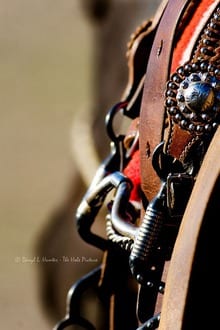 GoHorseShow.com asked Persechino about the status of the Steward program, and the possibility of it being improved. “First, I want to state that all of us should consider ourselves ‘stewards.’ Whether we are one in an official capacity or one who is a steward of the breed, the oneness is on all of us. AQHA believes that its stewards program is good but certainly has room for improvement, and yes, we are undertaking that task,” he says. “Every official steward just received a letter signed by the members of AQHA’s Executive Committee letting them know the Association is undertaking the task of improving the program. What none of us can do is transfer our responsibility of the humane treatment of all horses to someone else – even an AQHA Steward.”
GoHorseShow.com asked Persechino about the status of the Steward program, and the possibility of it being improved. “First, I want to state that all of us should consider ourselves ‘stewards.’ Whether we are one in an official capacity or one who is a steward of the breed, the oneness is on all of us. AQHA believes that its stewards program is good but certainly has room for improvement, and yes, we are undertaking that task,” he says. “Every official steward just received a letter signed by the members of AQHA’s Executive Committee letting them know the Association is undertaking the task of improving the program. What none of us can do is transfer our responsibility of the humane treatment of all horses to someone else – even an AQHA Steward.”
Persechino continues, “When we see something unacceptable – misuse of equipment, someone losing his or her temper, excessive training – we all need to have the confidence and the grit to address the individual and not wait for or run to a steward. Sometimes a steward might not be available or on the show grounds. It’s not comfortable having to correct our peers, we clearly get it. But unless and until a mental shift occurs where all professionals agree that things need to change, we can do anything we want to the stewards program and it won’t be effective.”
As far as the Animal Welfare Commission, Persechino explains
that they have not recommended anything yet. “There also has to be
industry support, input, guidance and ultimate buy-in. The AWC hasn’t even
begun to crack the egg on what might – or might not be – allowed on AQHA show
grounds.”
However, one of the more controversial points of discussion
regarding this topic is that the AWC’s final recommendations may side-step the
standard operating procedures of obtaining committee recommendation and instead
go directly to the Executive Committee for the vote.
“The recommendations of the Animal Welfare Commission likely
will go directly to the Executive Committee but not before there is widespread
industry input, including working with and through those organizations in the
alliance program,” says Persechino. “Again, for anything to be effective, AQHA and the Commission
have to work with the industry to bring about the changes that need to be
made.”
**Let us know what you think by voting in our poll and writing a comment below**


